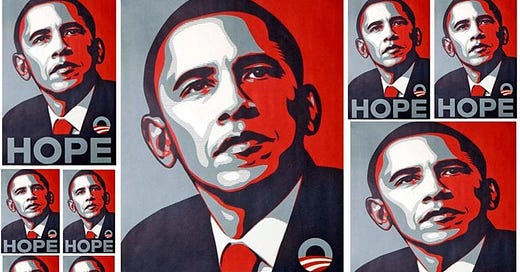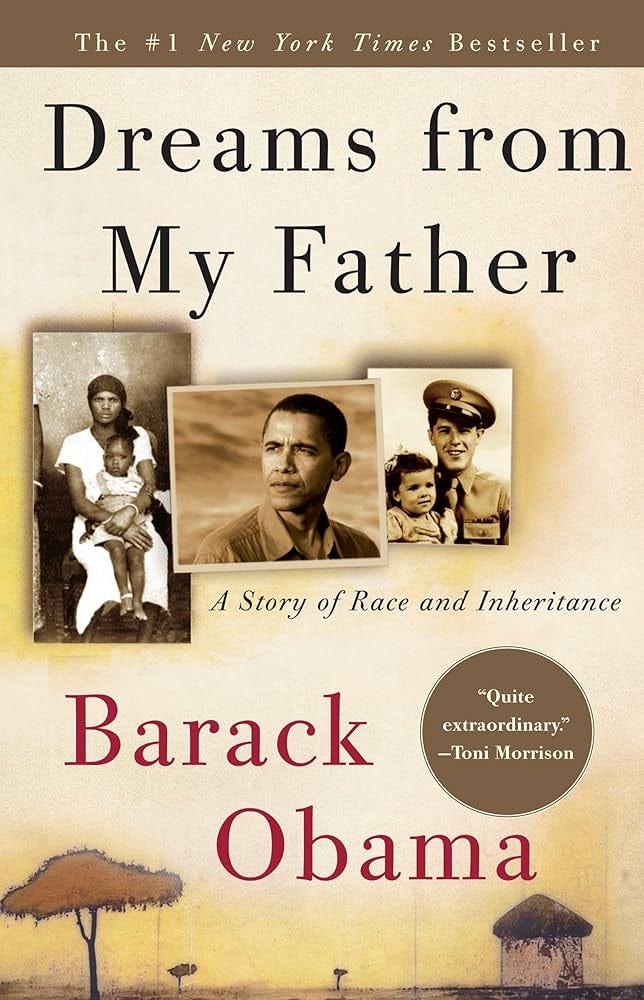Dreams Deferred and Deserved: Barack Obama’s Unfinished Candidacy
Retro Book Review (#2) of Barack Obama's Dreams from My Father: A Story of Race and Inheritance
Extended note to The Vestibule’s subscribers: As the United States of America’s current political mess unfolds, with open fascism ascendant and open defiance growing, I’ve read numerous social-media comments, when not hearing friends and colleagues saying, that they miss the Obama Years, or what’s now known as the Obama Era (20 January 2009 – 20 January 2017).
The relative (and I stress the word relative) calm of that near-decade, whose conclusion is now nearly a decade behind us, shines even brighter in our memories—or, at least, in my memory—as the Second Trump Regime’s political darknesses engulf us, with every day’s new developments, new headlines, and new reversions to the gutter politics that typify this regime’s kakistocratic oligarchy (or, if you prefer, oligarchic kakistocracy) being backward steps now occurring so regularly that we risk accepting them as normal when, to coin a phrase, they’re anything but.
Although The Vestibule isn’t a political newsletter in the way of Jeff Tiedrich’s gloriously and wittily profane Everyone Is Entitled to My Own Opinion or Heather Cox Richardson’s scholarly and soberly thoughtful Letters from an American, anyone who’s read my posts knows that my political principles, leanings, and sympathies resolutely oppose the current regime’s noxious White supremacy, appallingly tyrannical policies, and seemingly boundless incompetence.
And anyone who knows me knows that I exclusively call the current occupant of the Oval Office “Shitholio” when not employing more profane language to describe his cowardice, his crudity, his cupidity, his stupidity, and his venality. So, along with many other Americans, it’s difficult for me to resist the narcotic nostalgia of remembering the Obama Years as halcyon days of blissful peace and joyous order when the truth is that, for all their hopeful promise, these years disappointed us—or, at least, disappointed me—more frequently than I would’ve preferred even if their worst day remains preferable to the malign kleptocracy—and its resulting cultural lunacy—that we now occupy.
These cynical, even pessimistic, thoughts shouldn’t be taken as signs of surrender, but, indeed, of surrender’s opposite. We can’t lie, sit, or stand idly by as the institutions, the traditions, and, dare I say it, even the norms of the United States’s tattered democracy—a political project poisoned from its outset by attempting to drive the nation’s Indigenous inhabitants to extinction while enslaving native Africans into as terrible a form of chattel bondage as the world’s ever known, meaning that calling this scheme a democracy seems imprecise, if not risible, in its inaccuracy—get dismantled by a regime whose Project 2025 playbook isn’t merely an authoritarian wet-dream, but a totalitarian nightmare waiting to happen.
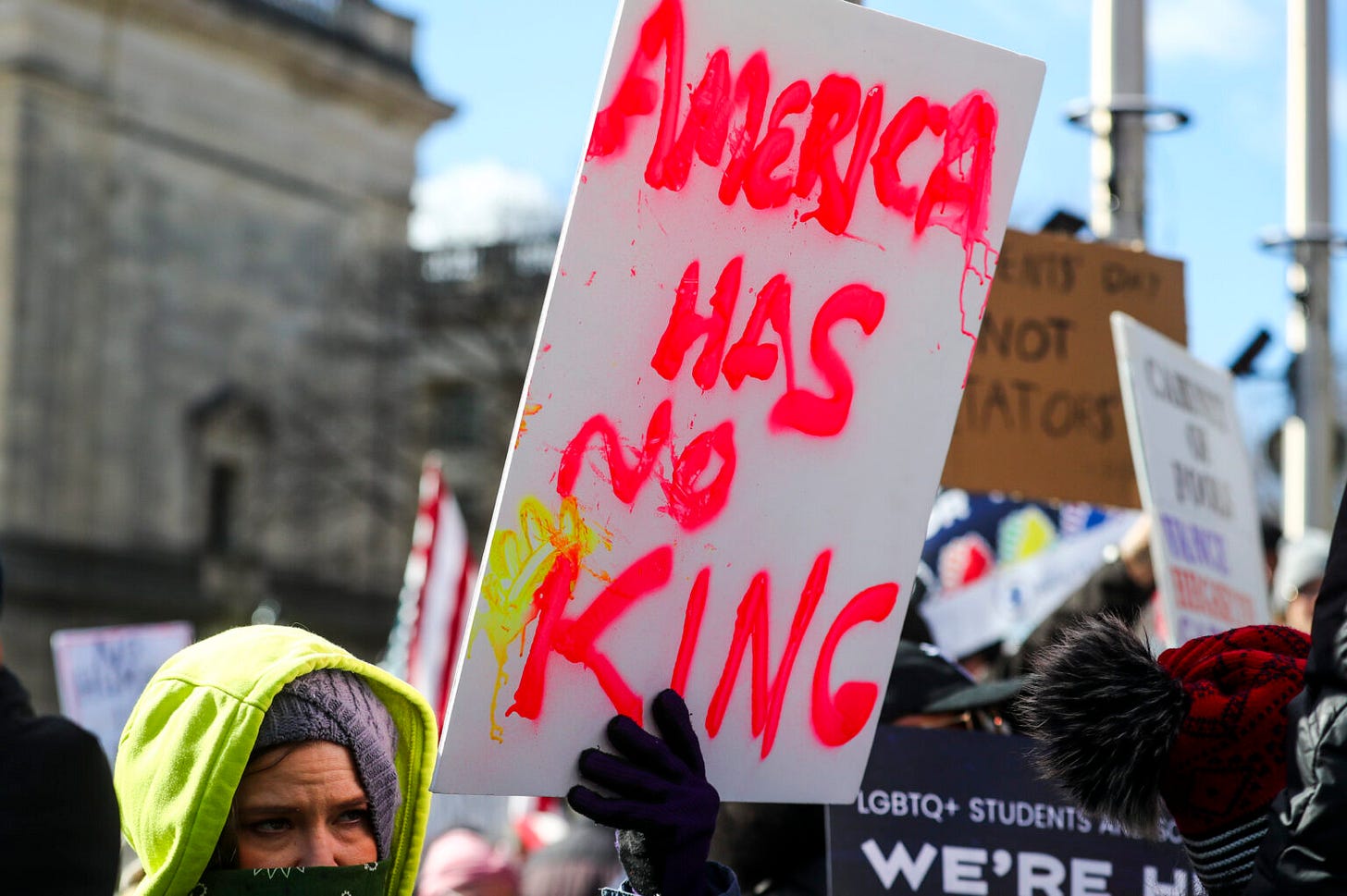
Resistance takes many forms, including the many street protests we’ve seen around the nation and the world since 20 January 2025, but most of us can’t be in the streets every hour of every day, so I offer the following Retro Review—of Barack Obama’s first book, 1995’s Dreams from My Father: A Story of Race and Inheritance—as a small, perhaps infinitesimal, bit of opposition to the recent tidal wave of bad news whose constancy I refuse to let overwhelm me (for now, at least—yes, for now!).
In other words, I hope you’ll find some spark or charge of defiance, no matter how tiny, while reading my assessment of Obama’s book, which I wrote in 2008, during the heat of his first presidential campaign. Yes, 17 years have passed, but I hope my words then (and now) enable you to remember that better times aren’t merely possible, but were actual no so long ago (times, lest we forget, that followed another disastrous presidency, one whose ostensible leader was a shallow, stupid, and vain man who lied the nation into the so-called War on Terror and its most catastrophic consequence, the United States’s 2003 second invasion of Iraq, a conflict from which we’ve never fully exited or recovered).
I first prepared this piece for Belles Lettres: A Literary Review, the then-official publication of Washington University in St. Louis’s Center for the Humanities, at the invitation of my dissertation advisor, Dr. Gerald Early, the person (alongside Dr. Guinn Batten of Wash U’s Department of English) that I most credit with helping me become the scholar I am today (if I’m any type of scholar at all), as well as the man who served as Belles Lettres’s founder, editor-in-chief, and intellectual titan during its entire (2002-2013) run. Belles Lettres ceased publication when Gerald departed the Center for the Humanities in Spring 2013 to become the founder, editor-in-chief, and intellectual titan of The Common Reader: A Journal of the Essay, a periodical that, in my humble (and not-at-all biased) opinion, is among the best cultural reviews of our day, one to which Gerald and his tireless managing editor, Ben Fulton, have invited me to publish essays, reviews, and blog postings again and again since its first online appearance in September 2013.
I regard these offers as personal and professional kindnesses that I’m happy to receive, being grateful for the fact that I’m in the company of TCR’s fabulous contributors, chief among them Gerald and Ben (wonderful authors in their own right), as well as TCR’s two crackerjack staff writers, the redoubtable Jeannette Cooperman and the formidable John Griswold. Belles Lettres, in my view, was not only TCR’s predecessor but also its trial run, with Gerald mentoring many young—and professionally unproven—academic writers, including myself (Ah, youth! How I loved you so!), by giving them what they most needed: a chance.
And what a marvelous gift the chance that Gerald took on me has been for my life. I published many pieces in Belles Lettres, all after receiving my doctorate from Wash U’s Department of English and American Literature (as it was then called), so when Gerald asked me to review Dreams from My Father in light of Obama’s presidential candidacy, I leapt at the opportunity (quite literally, since I recall jumping out of my seat immediately after reading Gerald’s email invitation, so happy was I that he’d accepted my pitch about evaluating Obama’s book).

I now present that review to you, under its original title and in its original form. Although I’ve aligned this piece with The Vestibule’s house style, I haven’t changed it much, beyond revising a few ungainly phrases and awkward clauses, meaning that it reads as if you’re encountering it in 2008. That’s a polite way of saying that I haven’t shifted the verbs into the past tense to account for the passage of time, although I have broken the meatier paragraphs into more digestible chunks and divided this piece into five sections (rather than four), all to improve its readability.
I’ve also retained the final four paragraphs that Gerald cut from the print version, perhaps because they too directly called to action the readers of a publication that Gerald wished to remain as non-partisan as possible even when covering political topics, or, as he always said about his own writing and his own classroom practice, “I try to be a liberal to every conservative and a conservative to every liberal.” And I couldn’t disagree with Gerald’s decision to edit my original piece’s ending since it heavily implied, if not outright recommended, that its audience vote for Barack Obama, who was a far-better choice than John McCain.
However laudable a position I may have found Gerald’s credo in those days, I have no interest in maintaining it now, not as autocracy nips at our heels and threatens to gobble us whole. I’ve posted Belles Lettres’s published review of “Dreams Deferred and Deserved” in the “Files” section below, so please decide for yourselves if Gerald made the right call in excising these paragraphs, if I’ve made the right call in preserving them, or if, perhaps, we’re both correct given the wildly different historical moments that each piece occupies.
Gerald also asked me to review Richard Wolffe’s autopsy of Obama’s first presidential campaign, titled Renegade: The Making of a President, after Wolffe’s book was published in 2009, so I’ll share that article with you in my next post.
All the best (and all my hopes)—Jason
Dreams from My Father: A Story of Race and Inheritance
Written by Barack Obama
Published by Three Rivers Press
Reprint Edition, 2004 (First Edition published in 1995)
442 pages
ISBN 1-4000-8277-3
$14.95
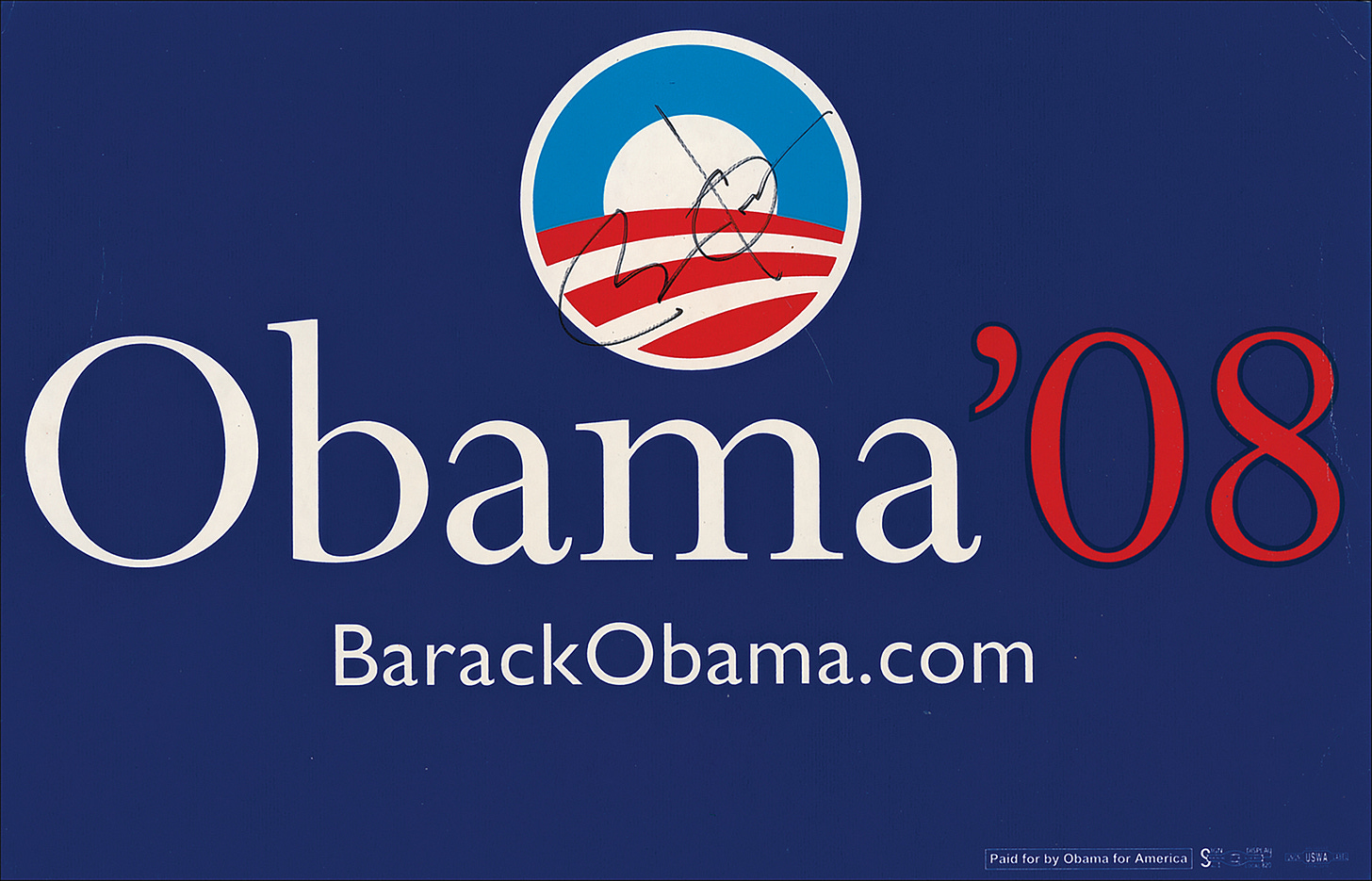
1. Campaign Fatigue (or How I Learned to Stop Worrying and Love the Blogs)
One day soon, I’m happy to report, the 2008 presidential election will be finished.
On that day, Americans can look forward to moving past the endless platitudes, countless debates, and mindless advertisements that bemuse, benumb, and belittle their lives. On that day, Americans will find themselves in a world mercifully (but temporarily) absent minute dissections of electoral strategies, campaign hierarchies, and candidate biographies. On that day, Americans need no longer watch, stupefied, as CNN’s Wolf Blitzer wonders which way voters who prefer flag pins to agricultural subsidies will jump or read, horrified, as Ann Coulter publishes another screed against whoever’s most recently defended the principles of critical thought.
On that day, in short, we can all rest, weary from a perpetual campaign that’s outlasted its welcome almost as much as Angelina Jolie’s most recent pregnancy did.
This election cycle has persisted for so long that, of the children who entered kindergarten in August and September 2008, one-third to one-half of their lives has featured the campaign as background noise. Although speculation about the presidency officially began on 28 December 2006, when John Edwards, the former North Carolina senator and 2004 Democratic vice-presidential nominee, declared his intention to run for the White House (Ohio Representative Dennis Kucinich’s 11 December 2006 announcement that he’d seek the Democratic Party’s nomination drew press coverage limited to are-you-kidding? chuckles), discussion about who will replace George W. Bush as the nation’s chief executive reached new levels of intensity after Hurricane Katrina drowned the Gulf Coast from New Orleans, Louisiana, to Mobile, Alabama, in August 2005.

Bush’s bungled management of the federal government’s response to this disaster, no matter how stridently his surrogates defended his behavior by defaming the actions of state and local officials (particularly in Democratically-controlled New Orleans), became the new standard for government incompetence. Coupled with the ongoing fiasco in Iraq, the systemic corruption in Congress (thanks to House Speaker Tom DeLay and Washington lobbyist Jack Abramoff), and the perception that the Administration was unconcerned about the economic difficulties facing middle- and lower-class Americans, Bush’s problems, reflected in plummeting public-opinion polls, fueled discussions around water coolers, dinner tables, and prayer circles about who would step into the office that Bush, on 20 January 2009, must vacate.
And on that day, Barack Obama—the first-term Democratic senator from Illinois; the man who electrified the 2004 Democratic National Convention by extolling his country as a place where “the hope of a skinny kid with a funny name who believes that America has a place for him, too”1 allowed Obama to deliver a keynote address to a group of people still mispronouncing his name; the candidate who surprised nearly everyone by out-campaigning master campaigners Hillary and Bill Clinton; and the politician who launched a thousand blogs—stands an excellent chance of becoming the 44th President of the United States.
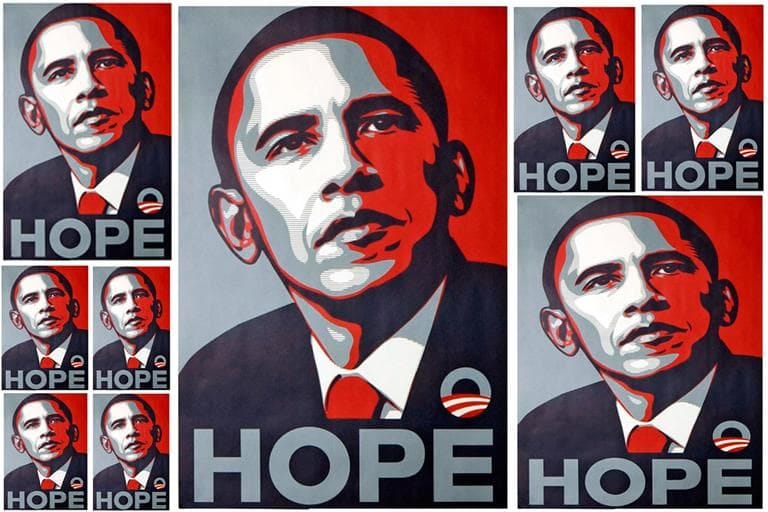
2. New Kid on the Block
Obama’s political ascent has surprised not only seasoned observers but also those individuals who pushed him to seek the presidency in the first place. The person most taken aback, as evinced by the deer-in-the-headlights expression that overtakes his face whenever the topic of Obama’s fundraising prowess comes up on PBS’s The NewsHour with Jim Lehrer, is New York Times columnist and conservative commentator/flack David Brooks. One would expect Brooks to be pleased by Obama’s performance, especially considering that Brooks published a column titled “Run, Barack, Run” in the Times’s 19 October 2006 edition that, as far as I can determine, is the first mainstream press piece seriously devoted to an Obama candidacy.
The Brooks of 2008, however, with the prospect of an Obama presidency approaching reality, seems perplexed that a biracial man with “limited executive experience” (as Brooks and his right-leaning brethren robotically repeat) has come so far so fast. Brooks’s argument, in “Run, Barack, Run,” amounts to platitudes about how Obama’s globalized (or at least cosmopolitan) perspective, formed by the man’s unique background as the son of a Kenyan father and a Kansas mother who lived in Hawai’i, Indonesia, Los Angeles, and New York City before settling in Chicago, uniquely equips Obama to tackle the challenges that Bush’s failed policies and erratic presidency have created. Brooks’s piece, like most of his columns, is short, direct, and trite, concluding with the saccharine notion that an Obama candidacy will be good for the country: “It may not be personally convenient for him, but the times will never again so completely require the gifts that he possesses. Whether you’re liberal or conservative, you should hope Barack Obama runs for president.”2
An old adage reminds us to be careful when wishing, for the wish may come true. Such has happened to Brooks, pollster Frank Luntz, and numerous other Republican pundits who’ve made this claim so frequently that, early in the Democratic primary process, they may actually have believed it. It’s as if the Republican intelligentsia (an oxymoronic term, perhaps)—knowing that the party, despite its professed love for Colin Powell, Clarence Thomas, J.C. Watts, and Condoleezza Rice, would never nominate a Black American for the presidency—was able, by proclaiming the abstract virtues of an Obama candidacy, to convince itself that even a failed Obama run would heal the racial polarization that the GOP is largely responsible for creating, while ignoring the tragedy that it’s taken 232 years from the signing of the Declaration of Independence and 221 years from the signing of the Constitution for any person besides a White man to receive a decent opportunity at winning the White House.
The subtext of Brooks’s piece is that Obama, an African-American Democrat, can absolve the Republicans (and their Democratic counterparts, the Dixiecrats) of systematically employing race as the most divisive issue in American politics since 1954’s Brown v. the Board of Education Supreme Court ruling desegregated the public schools and shocked the Jim Crow South. Obama, according to this argument, could, merely by throwing his hat into the ring, erase the uncomfortable political truth that Richard Nixon saw so clearly when he recommended, after Barry Goldwater’s landmark defeat in the 1964 presidential election, that the Republicans adopt the so-called Southern Strategy to reclaim power: blame Black Americans for their lot in life by co-opting their historical victimization as the province of the newly disenfranchised, working-class White man.
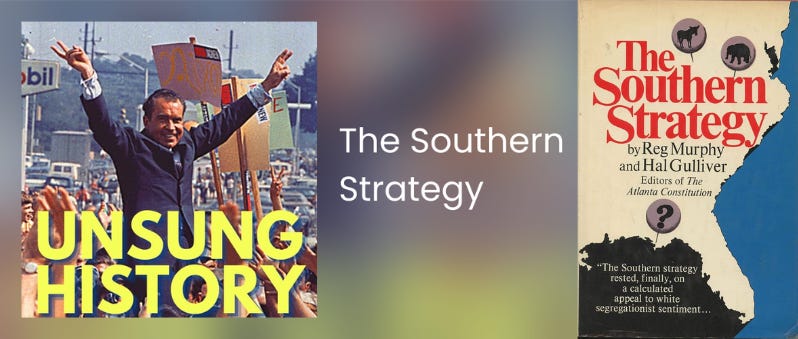
This idea is so absurd to anyone who’s studied the history of slavery, Reconstruction, segregation, the Civil Rights Movement, and America’s class system for more than two weeks that it scarcely seems credible. But, as Lyndon Johnson—no less a clear-eyed political observer than Nixon—presciently commented after signing the 1964 Civil Rights Act and the 1965 Voting Rights Act into law, these two actions delivered the South and, with the exceptions of the Carter and the Clinton presidencies, the White House into the GOP’s trembling hands.
Brooks, as his recent behavior makes clear, never seriously expected Obama to win anything more than a few primaries. Brooks, like so many of us, presumed that Hillary Clinton would waltz to her party’s nomination because she’s one half of the most famous brand in Democratic Party politics. Obama, after losing, would return to the Senate, work for social justice, retain his spellbinding command of the English language, give many fine speeches, vote with his party, and, with guile and luck, secure a position in the new Clinton Administration. To expect otherwise, it seemed, was either wishful thinking or outright madness.
Obama, of course, refused to follow this script. The Democratic Party’s electorate defied all expectations by turning out in large numbers to vote for Obama, for Clinton, for Edwards, and even for Kucinich. The campaign lurched from thrilling victory to ham-fisted concession speech to ridiculous photo-op in a contest that—despite its gutter sniping, implicit sexism, and ugly race-baiting—engaged the nation’s attention more than most primary seasons. Obama seemed fresh not simply because he spoke eloquently about the war, the economy, and the promise of a better tomorrow but also because he and his handlers knew that Americans of all stripes, ideologies, and dispositions wanted change so badly that, for the first time in American history, even a Black man could become a serious White House contender.
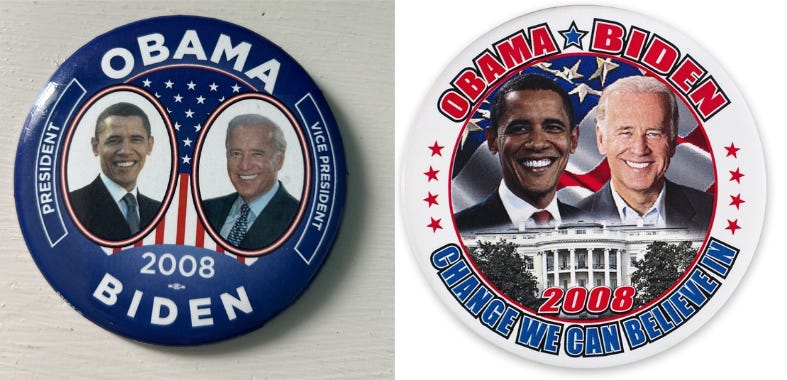
3. Man of the People
Brooks, in “Run, Barack, Run,” devotes attention to Obama’s 2007 book, The Audacity of Hope: Thoughts on Reclaiming the American Dream, while ignoring Obama’s 1995 memoir (republished in 2004 to take advantage of Obama’s newfound national prominence), Dreams from My Father: A Story of Race and Inheritance. This oversight explains much of the column’s anemic impact for the simple reason that The Audacity of Hope (a title taken from the sermon that provoked Obama’s religious awakening, delivered in Chicago by Trinity United Church of Christ’s now-infamous Reverend Jeremiah Wright) is much less compelling than Dreams from My Father.
Whereas The Audacity of Hope follows the tried-and-true formula of extended press release masquerading as political analysis that first-term senators routinely publish, Dreams from My Father, written before Obama won election to the Illinois State Senate in 1996, recounts in vivid detail the man’s early life in Hawai’i, his years in Indonesia (where he attended Djakarta’s International School to supplement his local education), his schooling at Los Angeles’s Occidental College, his time at Columbia University (where he worked one summer clearing construction sites), his first career in Manhattan as a research assistant for a consulting firm to multinational corporations, his decision to become a community organizer in Chicago, and, most tellingly, his trip to his father’s ancestral village in Kenya.
The breadth of Obama’s experience, who was only 33 years old when the book was published, is impressive when compared to the mundane childhoods that many of his readers endured, rooted in one or two places for most of their lives. Obama emerges, by his own account, as a person who frequently feels rootless, restless, and lonely. He’s rarely at home, even when at home, afflicted by an unrealistic image of his absent father, who looms as a figure of strength, enchantment, wonder, and unassailable authority to a boy who, while growing to manhood, can’t comfortably reconcile his biracial heritage.
The most startling aspect of Dreams from My Father, particularly for readers accustomed to Obama’s polished public speeches, is the fragmentary identity that he discusses in every chapter. Obama constantly searches for the larger meanings of life as a Black American not simply because his society marginalizes him in ways both cruel and subtle but also because he can’t determine which culture (White or Black, proud American or skeptical citizen, educated professional or salt-of-the-earth Midwesterner) to choose. The book is so smartly written—with evocative prose, narrative urgency, expert pacing, and lucid characterizations of the people in the author’s life—that Obama, whatever his political future, could one day make a fine living as a novelist. The reader initially expects to hear the account of a charmed life that begins humbly, then builds steadily to success: Horatio Alger on the South Side, so to speak.

The story, however, is far more complicated. Although Obama infrequently alludes to James Baldwin, Langston Hughes, Zora Neale Hurston, and Richard Wright, his reading of these significant American authors (plus Harriet Beecher Stowe, Ernest Hemingway, and W.E.B. Du Bois) stands him in good stead. Dreams from My Father fulfills its project to “speak in some way to the fissures of race that have characterized the American experience, as well as the fluid state of identity—the leaps through time, the collision of cultures—that mark our modern life”3 so well that it permits readers like myself, with no experience of persistent discrimination, to recognize a dispiriting truth: The progress of race relations during the past 54 years, much ballyhooed by White commentators of all political persuasions, is, at best, the type of self-congratulatory patriotism that may win elections, but that rarely solves problems.
Obama’s invocation of fissure, fluidity, and collision should thrill British writer Salman Rushdie, who’s pronounced on several occasions that the experiences of migration, of crossing borders, and of reforming one’s identity are primary features of the globalized 21st Century. These physical and psychological dislocations, Obama observes, also define America’s history, no matter how reactionary, nativist, or blinkered some segments of its population may be.
Upon reading Dreams from My Father soon after Obama’s 2004 DNC address, I thought to myself, “This fellow should run for President someday.” Obama’s intelligence, thoughtfulness, and insight into the racial conflicts that define both his country and himself aren’t only refreshing in their complex understanding but also necessary to rebuilding America’s moral authority and battered image after Bush’s dumbed-down, go-with-my gut, shoot-from-the hip style. I didn’t expect the possibility of an Obama presidency to arise so soon, but, upon re-reading Dreams from My Father in light of Obama’s 2008 White House bid, I realize that my first reaction was, in fact, correct.
Obama’s candidacy, in other words, is good for America, but not for the disingenuous reasons advanced by David Brooks, Frank Luntz, and Rupert Murdoch. Obama, although rarely saying so publicly, forces White voters to consider their own racial assumptions, biases, and anxieties more deeply than they have in a very long time. Some hate him for it. Others can’t wrap their minds around it. And yet others, particularly younger voters between the ages of 18 and 30, seem ready for it.

I’d written off the possibility of an African-American presidency during Bill Clinton’s first term, when his Administration’s much-publicized Commission on Civil Rights filed voluminous reports documenting ongoing problems of racial and ethnic unfairness in hiring practices, lending practices, and housing practices that were promptly ignored in favor of “reforming” the welfare system. A Black president was only possible in fiction, particularly cinematic and television narrative, with Morgan Freeman’s assured performance as President Tom Beck in Mimi Leder’s 1998 film Deep Impact and Dennis Haysbert’s marvelous portrayal of President David Palmer in the first four seasons of Fox Television’s real-time counterterrorist drama 24 setting the standard for this character type.
But it would never happen in my lifetime, I believed, because, at the end of the day, the American electorate is simply not progressive enough.
I may still be proved correct. Obama’s major opponent, John McCain, Arizona’s senior senator and the Republican Party’s 2008 presidential nominee, is running a competitive campaign despite his embrace of nearly every major policy advanced by George W. Bush (at a time when public opinion polls indicate that even Republicans think that the nation is “on the wrong track,” in imagery that suggests a runaway freight train). McCain, according to several political blogs (particularly the Huffington Post) has been shielded from serious scrutiny by the protracted Democratic primary process and by an admiring press corps (whom McCain has courted for years as part of his electoral base). This analysis is essentially correct, for despite Obama’s occasionally fiery rhetoric about the Iraq War and his soaring oratory about the possibilities of building a better future, he can’t take for granted victory on 4 November 2008.
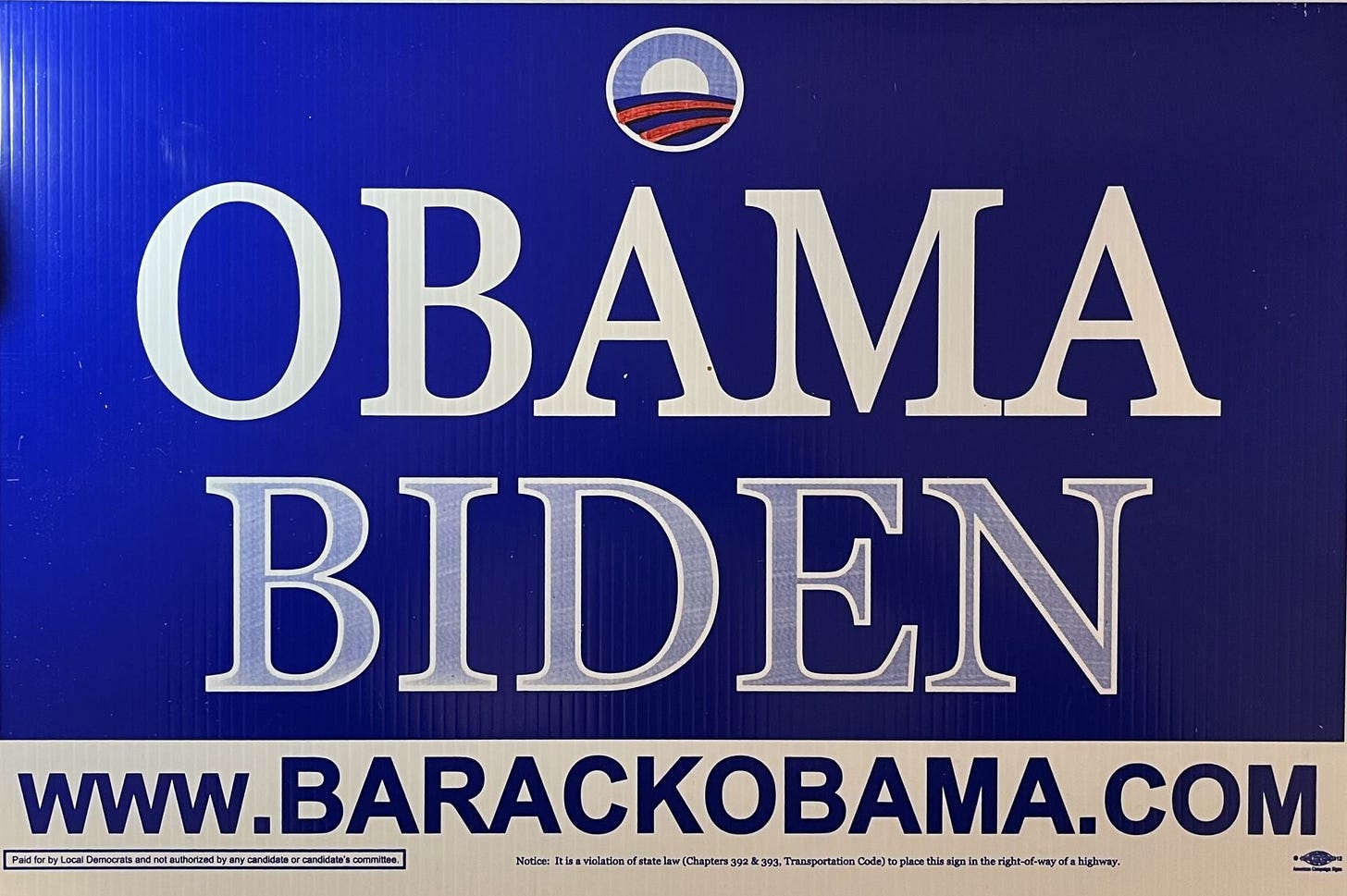
4. Pasts, Presents, & Futures
Reading Dreams from My Father can cure the misperceptions about Obama that make Bill O’Reilly, Sean Hannity, and Rush Limbaugh chortle with glee. The most pernicious—that Obama is a Muslim fifth-columnist who’ll deliver the nation into a different (and more malign) theocracy than Bush’s aggressive Christianity—is so explosive a charge that Obama’s supporters never seem to ask an important question: Is being Muslim now a crime that prevents a person from achieving the highest public office? The unfortunate answer, even seven years after 9/11, seems to be yes, which tells us as much about the nation’s frenzied psyche as it does about Obama himself.
The missteps that Candidate Obama has made—publicly observing, early in the primary fight, that Hillary Clinton’s aggressive campaign style meant that the claws were coming out; referring to female reporters and admiring female voters as “Sweetie;” not vociferously challenging the charges of elitism leveled against himself and his wife during the primary campaign—arise from his belief that division begets division, meaning that, although we shouldn’t overlook, underplay, or ignore the realities of American racial strife, we also shouldn’t permit these disagreements to overwhelm our private or public lives.
Dreams from My Father documents Obama’s difficult coming-to-terms with his biracial identity that, in the fashion of every good bildungsroman, requires a trip home to teach Obama who he truly is. His visit to Kenya, occupying the book’s final third, alternately enthralls, excites, and disappoints Obama. He doesn’t find answers to all the questions that visiting his father’s family and tribal ancestors initially promises. Kenya, however, teaches Obama not only about the consequences of colonialism, governmental corruption, and self-hatred that resonate with the contradictory feelings of worthlessness and pride that he sees in the residents of Chicago’s South Side but also about the impossibility of ever fully comprehending the racial paradoxes that his book carefully describes. One of Dreams from My Father’s best passages comes during a discussion between Obama and his Kenyan relatives: “I looked at Granny, and she nodded at me, and I knew then that at some point the joy I was feeling would pass and that that, too, was part of the circle: the fact that my life was neither tidy nor static, and that even after this trip hard choices would always remain.”4
Those hard choices, we now know, led Obama, after his study at Harvard Law School, back to Chicago, where, as Ryan Lizza notes in his 21 July 2008 New Yorker article “Making It” (the centerpiece of the magazine’s most controversial summer issue, with a cover painting that assembles, in one image, every major stereotype about Barack and Michelle Obama circulated by their detractors), Obama learned to be a hard-nosed politician with an outwardly soft touch. Dreams from My Father doesn’t cover Obama’s time at Harvard, his path toward marriage (apart from a brief epilogue in which Obama ascribes all improvements in his character to Michelle, who, he proudly states, was a big hit with both the White and Black sides of his family), or his early political career. The book concludes at the Obama wedding ceremony, with Obama’s Kenyan half-brother Abongo toasting absent friends.
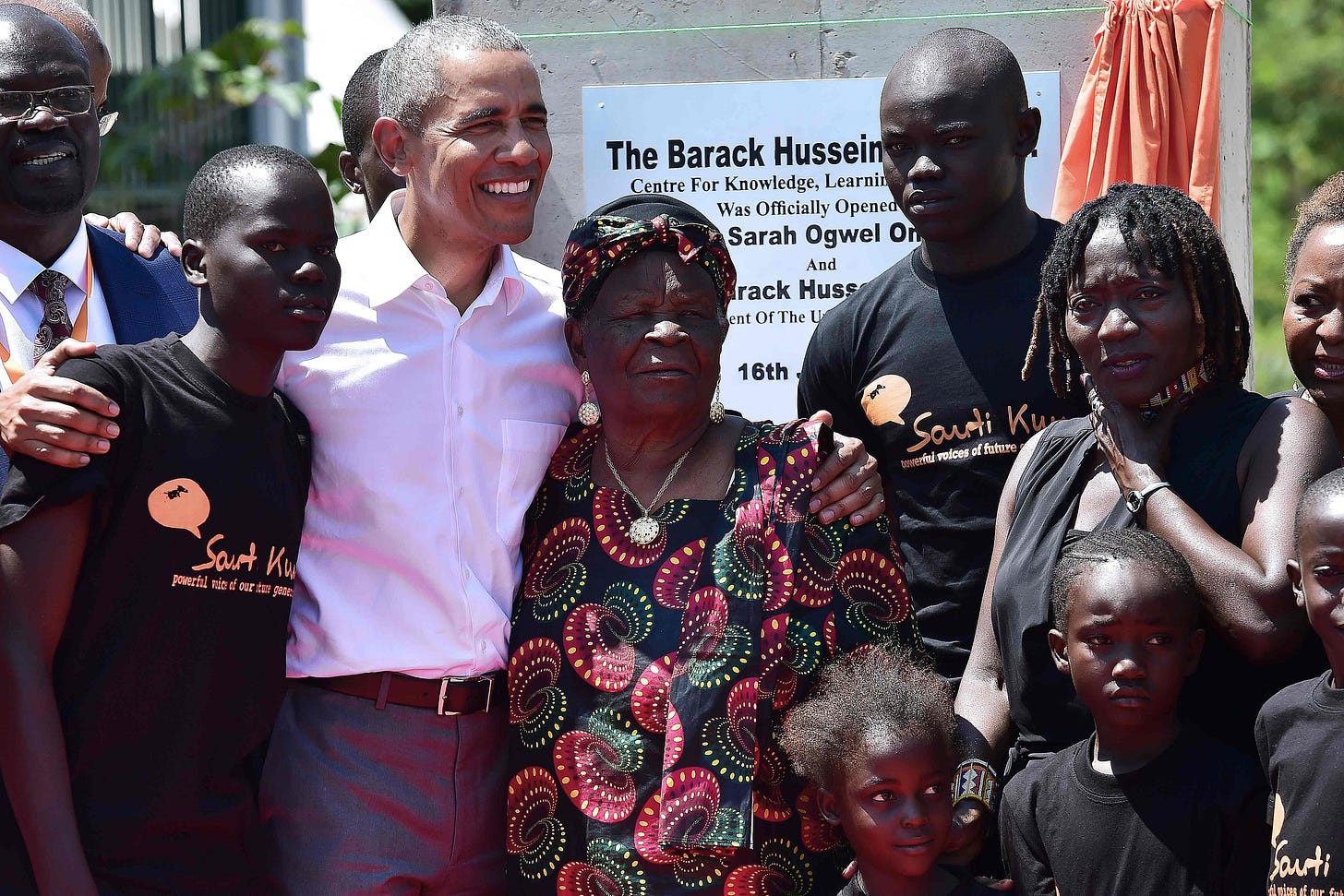
As fascinating as the Kenya trip is, Obama’s account of his time working as a civil-rights activist in Chicago’s Altgeld Gardens housing project, in one of the South Side’s bleakest neighborhoods, tells us the most about the potential president’s priorities. Obama’s lengthy examination of the problems besetting Altgeld’s residents, including their fight to secure a job-training center for a blighted area whose factory work has disappeared, is among the best evocations of urban American life that I’ve ever read (and that, in its understated fury at the betrayal of the working class, would not only make The Jungle’s Upton Sinclair proud but should also make David Simon, creator of Obama’s favorite television program, HBO’s superlative Baltimore drama The Wire, happy).
Obama’s discussion of what Harold Washington’s groundbreaking mayoralty meant to Chicago’s Black residents is heartbreaking in its honesty and despair (Washington’s unexpected death, in 1987, ended the possibility, at least in Obama’s mind, of Chicago ever emerging from its bruising racial polarization to embrace a more responsive politics). Obama’s incisive appraisal of the appealing, yet dissatisfying (to him) principles of Black nationalism offers the reader a sympathetic portrait of Malcolm X’s importance to American history that nevertheless rejects Malcolm’s most piercing calls for separatism. Obama, in one remarkable chapter, discusses how a group of concerned Altgeld residents tries to force the Chicago Housing Authority to remove asbestos from their apartments, only to see the CHA director struggle with an Altgeld spokeswoman for control of a microphone during a public meeting that promptly descends into chaos. Although a partial cleanup occurs, with the help of federal Housing and Urban Development dollars, Obama wearily concludes, after many of Altgeld’s most passionate residents lose interest in activism, that the most intractable problems in the South Side projects won’t be easily (if ever) alleviated.
This complex attitude—hopeful, idealistic, pragmatic, cynical, probing—typifies Dreams from My Father. No matter how many times commentators proclaim Obama to be the Black candidate who’s transcended race, reading his first book demonstrates how searchingly he questions his own racial assumptions and how intelligently he analyzes the racial fault lines that define American life. Obama can’t fully dismiss the reactionary, nativist, and bigoted White people he encounters, for he knows that they, too, have endured job loss, historical upheaval, and economic disappointment.
In this regard, New York City teaches Obama that race and class, at least in America, are inseparable:
But whether because of New York’s density or because of its scale, it was only now that I began to grasp the almost mathematical precision with which America’s race and class problems joined; the depth, the ferocity, of resulting tribal wars; the bile that flowed freely not just out on the streets but in the stalls of Columbia’s bathrooms as well, where, no matter how many times the administration tried to paint them over, the walls remained scratched with blunt correspondence between niggers and kikes.5
Anyone who can envision George W. Bush or John McCain writing a passage half as accurate, forthright, or compassionate as this one possesses an imagination more expansive, and certainly more vivid, than mine.
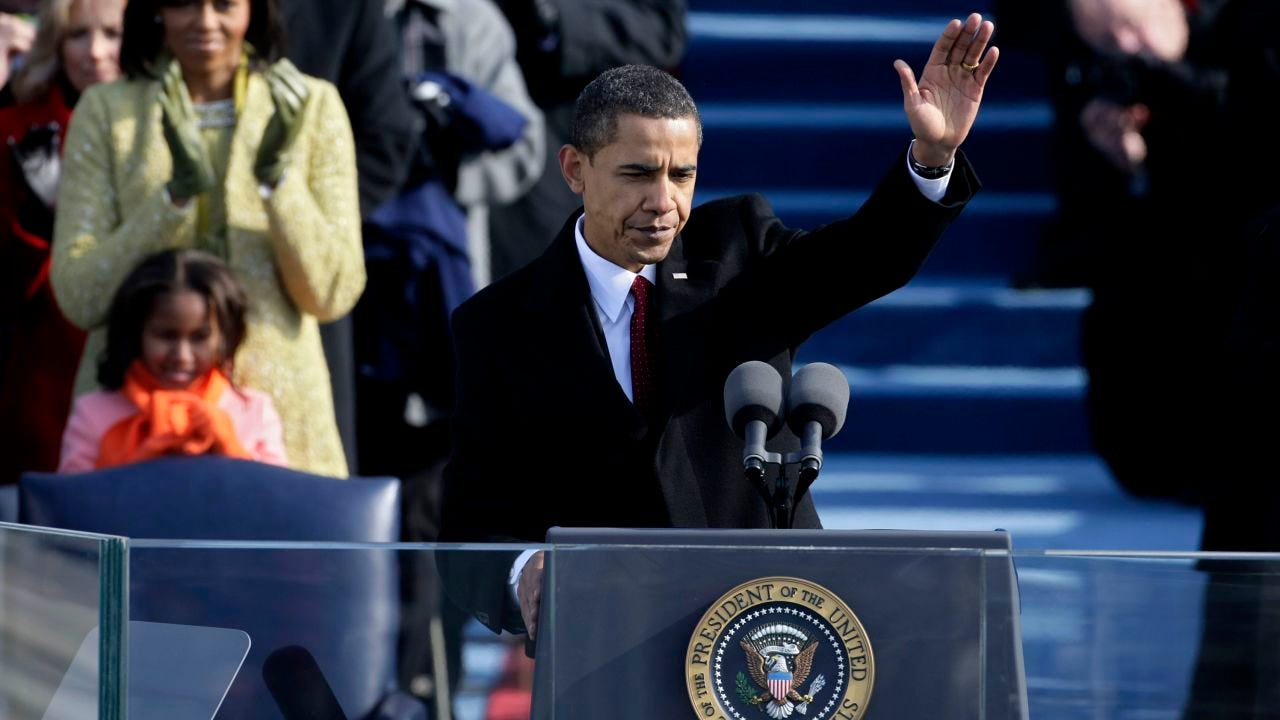
5. Yes We Can (or We Can’t)
Despite the plaudits that Dreams from My Father deserves, it includes such precise detail that the reader can’t help but suspect that Obama, no matter how good his memory, has reconstructed large portions of this book—particularly its long stretches of dialogue—from after-the-fact conversations with the people who share his narrative. This notion, if true, is a memoirist’s privilege. Obama mostly avoids the tendency to sanitize, sentimentalize, or prettify the events of his life, while he exhibits no fear about the potential problems that admitting to binge drinking, pot smoking, and cocaine use may create. Republicans have already pounced on these passages, but considering Bush’s and McCain’s hard-partying reputations, Obama’s youthful dissoluteness seems almost quaint by comparison.
Perhaps the signature moment of 2008’s Democratic primary battle came when Bill Clinton, near the beginning a dramatic fall from grace that revealed how even the man whom Paul Mooney and Toni Morrison both termed the nation’s “first Black president” would attempt to diminish a biracial candidate who was improbably outpolling Hillary Clinton in both caucus and primary states, declared during a 14 December 2007 interview with the titular host of PBS’s The Charlie Rose Show that electing Obama meant that voters were prepared to “roll the dice” on a less-experienced candidate.6
This comment’s myopia was surprising, particularly considering the inconvenient facts that Clinton, when he declared his intention to seek the presidency on 3 October 1991, had a much-lower national profile than Obama; that Hillary Clinton, who was first elected to the United States Senate in 2000, had served in national office only four years longer than Obama (her eight years as First Lady notwithstanding); that Obama’s time in the Illinois State Senate, where he served from 1997 to 2004, meant that he’d held elected office longer than Mrs. Clinton; that Bill Clinton was as well known for bad real-estate deals and allegations of philandering as his policy positions during his 1992 campaign against then-President George H.W. Bush; and, most significantly, that 43 percent of the American electorate had rolled the dice in Clinton’s favor on 3 November 1992.
The truth, as numerous editorialists, commentators, pundits, and bloggers pointed out, is that no matter how well we think we know a candidate, even one so notable as Obama, we always roll the dice on the outcome. We simply can’t predict exactly what a new president will do or say, partly because history is unmanageable and partly because political power affects people in fascinating, uncomfortable, and, as George W. Bush has proved, corrosive ways.
Clinton’s comment, however, drew into sharp relief just how formidable a candidate Obama had become. When the former president, a man who considers himself to be the smartest political strategist in his party (if not the country) during the past 25 years, worried that not even Hillary Clinton—a formidable political thinker, strategist, and force in her own right—might prevail, Obama must’ve known that his chances were better than anyone had expected.
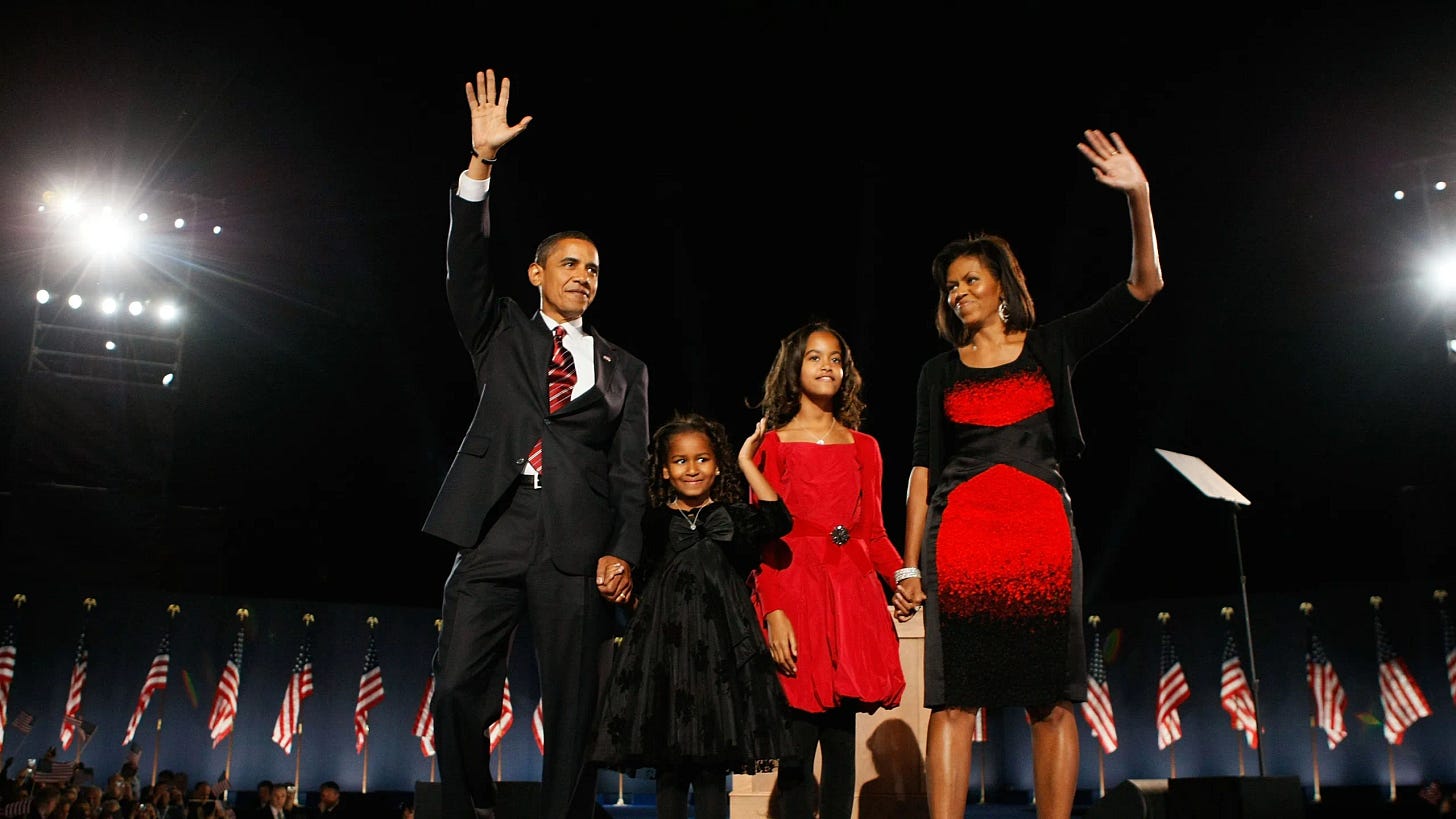
Even so, the most prescient comment recorded in Dreams from My Father comes during Obama’s first meeting with his Kenyan half-sister, Auma. She has flown to Chicago to spend time with her brother, who promptly takes her around the South Side so that she can see how he lives and works. Auma asks Obama if he’s become a community organizer and activist on behalf of the people he tries to help:
I shrugged. “For them. For me.”
That same expression of puzzlement, and fear, returned to Auma’s face. “I don’t like politics much,” she said.
“Why’s that?”
“I don’t know. People always end up disappointed.”7
This exchange forecasts the road ahead of Obama should he become the 44th President of the United States. He will, at some point during his presidency, disappoint every person who votes for him (and, it goes without saying, everyone else). No matter how hagiographic the magazine profiles, campaign videos, and instant biographies may be, Obama is a human being who can’t fulfill the unreasonably lofty expectations that his most ardent admirers hold.
His centrist stance on many issues, including the Foreign Intelligence Surveillance Act (FISA), military spending, and faith-based governmental programs, has already infuriated enough progressive supporters to make his campaign staff worry about retaining this voting bloc’s enthusiasm during the general election. Obama also won’t be able to repair all the damage created by Bush’s Administration even if he (Obama) receives two terms in office. He’ll occupy the unfortunate position of Mr. Fix-It-in-Chief, so whether he, or anyone, can turn Bush’s political lemons into palatable lemonade is an open question.
Dreams from My Father, however, makes its reader more sanguine about Obama’s ability, experience, and judgment than even his memorably combative 28 August 2008 acceptance speech at the Democratic National Convention. The book reveals a man who’s resolved his racial identity successfully enough to accept the fact that, no matter how many times he tells the story of his White mother and grandparents, he’ll always be seen by White people as a Black American. It exposes how deeply he feels the wounds of racist behavior, but how capably he understands this behavior’s origins. It demonstrates how the most significant figures in Obama’s life, despite the book’s title, are not men, but women. It showcases a mind that continues to explore the contradictions of the American character even as it marvels at achievements of the American experience.
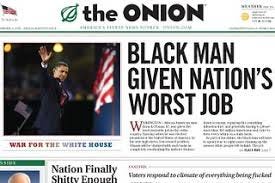
Dreams from My Father is also one of the best American memoirs published during the 20th Century’s final quarter, taking an honored place alongside Annie Dillard’s An American Childhood (1987), Lorenzo Carcaterra’s A Safe Place (1993), and James McBride’s The Color of Water (1996). Obama’s dreams—of his father, of his family, and of his future—can’t deter him from discussing the troubling truths about race, identity, and place that he’s faced all his life. He emerges as an imperfect man who recognizes that his imperfections, as much as they belong to himself, also belong to his country. This idea may rankle those Americans who insist that the United States’s virtues outweigh its flaws, but for those Americans who realize that their nation is not now, nor ever has been, the perfect union to which it aspires, Dreams from My Father speaks to their experience far more authentically than the false patriotism that the Bush Years have made fashionable.
Obama’s campaign slogan, “Yes We Can,” has inspired millions of young people to become involved, even invested, in electoral politics. For this reason alone, we should thank Obama for seeking the presidency. I was a college student, on and off, from 1990 to 2004 (and have taught college students since 1999), but I’ve never seen young Americans take to a national candidate as they’ve taken to Obama.
Bill Clinton certainly inspired younger voters during his 1992 campaign, but not in the numbers or the intensity that Obama has. At Memphis, Tennessee’s Rhodes College, where I studied as an undergraduate student, Clinton was popular, but couldn’t convince everyone, even my own roommate, to vote for him. At the University of Guam, where I currently teach, Obama, by the time of the island’s 3 May 2008 Democratic primary, was, by my observation, the choice of 90 percent of the students with whom I interacted. Hillary Clinton captured the remaining ten percent. The one student who expressed interest in John McCain’s candidacy was considered by his peers to be the pitiable product of poor education, in much the same way that people consider an errant child who’s just screamed obscenities in church the unenviable product of poor parenting.
If any student, teacher, parent, or citizen reads Barack Obama’s Dreams from My Father: A Story of Race and Inheritance, that person is likely to finish the book by thinking, “Yes, he can.” Obama’s pledged great change in the culture of Washington politics, in America’s world standing, in the nation’s economic future, and in the Iraq War’s direction, yet no one, not even Obama, knows whether he can deliver on these promises if, on 20 January 2009, he takes the presidential oath of office.
Let’s hope, for all our sakes, that he can.
FILES
NOTES
Barack Obama, “Keynote Address at the 2004 Democratic National Convention,” 27 July 2004, https://www.youtube.com/watch?v=eWynt87PaJ0 and https://www.c-span.org/program/historic-convention-speeches/barack-obama-2004-democratic-national-convention-keynote-speech/193754.
David Brooks, “Run, Barack, Run,” New York Times, 19 October 2006, http://select.nytimes.com/2006/10/19/opinion/19brooks.html.
Barack Obama, Dreams from My Father: A Story of Race and Inheritance, first published in 1995, Three Rivers Press, 2004, pg. vii.
Ibid., pg. 377.
Ibid., pp. 120-121.
The Charlie Rose Show, “An Hour with President Bill Clinton,” 14 December 2007, https://charlierose.com/videos/18658.
Obama, Dreams from My Father, pp. 209.

